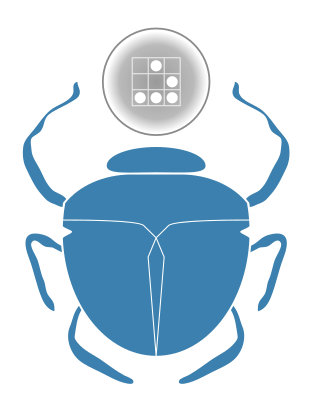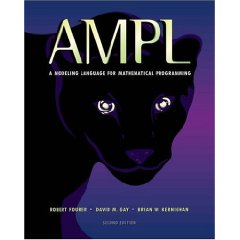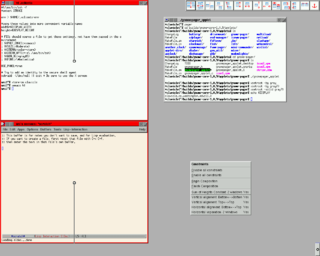Related Research Articles
In artificial intelligence and operations research, constraint satisfaction is the process of finding a solution through a set of constraints that impose conditions that the variables must satisfy. A solution is therefore an assignment of values to the variables that satisfies all constraints—that is, a point in the feasible region.

Cairo is an open-source graphics library that provides a vector graphics-based, device-independent API for software developers. It provides primitives for two-dimensional drawing across a number of different backends. Cairo uses hardware acceleration when available.

AMPL is an algebraic modeling language to describe and solve high-complexity problems for large-scale mathematical computing . It was developed by Robert Fourer, David Gay, and Brian Kernighan at Bell Laboratories. AMPL supports dozens of solvers, both open source and commercial software, including CBC, CPLEX, FortMP, MOSEK, MINOS, IPOPT, SNOPT, KNITRO, and LGO. Problems are passed to solvers as nl files. AMPL is used by more than 100 corporate clients, and by government agencies and academic institutions.

Scwm or Scheme Constraints Window Manager is a window manager for the X Window System. Its main features are dynamic configurability and programmability via a language based on GNU Guile and the embedded arithmetic Cassowary constraint solver. The primary developers were Greg Badros and Maciej Stachowiak.
Google Developers is Google's site for software development tools and platforms, application programming interfaces (APIs), and technical resources. The site contains documentation on using Google developer tools and APIs—including discussion groups and blogs for developers using Google's developer products.

Bullet is a physics engine which simulates collision detection as well as soft and rigid body dynamics. It has been used in video games and for visual effects in movies. Erwin Coumans, its main author, won a Scientific and Technical Academy Award for his work on Bullet. He worked for Sony Computer Entertainment US R&D from 2003 until 2010, for AMD until 2014, for Google until 2022 and he now works for Nvidia.

Chapel, the Cascade High Productivity Language, is a parallel programming language that was developed by Cray, and later by Hewlett Packard Enterprise which acquired Cray. It was being developed as part of the Cray Cascade project, a participant in DARPA's High Productivity Computing Systems (HPCS) program, which had the goal of increasing supercomputer productivity by 2010. It is being developed as an open source project, under version 2 of the Apache license.
Enthought, Inc. is a software company based in Austin, Texas, United States that develops scientific and analytic computing solutions using primarily the Python programming language. It is best known for the early development and maintenance of the SciPy library of mathematics, science, and engineering algorithms and for its Python for scientific computing distribution Enthought Canopy.

Box2D is a free open source 2-dimensional physics simulator engine written in C++ by Erin Catto and published under the MIT license. It has been used in Crayon Physics Deluxe, Limbo, Rolando, Incredibots, Angry Birds, Tiny Wings, Shovel Knight, Transformice, Happy Wheels, and many online Flash games, as well as iPhone, iPad and Android games using the Cocos2d or Moscrif game engine and Corona framework.

ALGLIB is a cross-platform open source numerical analysis and data processing library. It can be used from several programming languages.
Augmented Lagrangian methods are a certain class of algorithms for solving constrained optimization problems. They have similarities to penalty methods in that they replace a constrained optimization problem by a series of unconstrained problems and add a penalty term to the objective, but the augmented Lagrangian method adds yet another term designed to mimic a Lagrange multiplier. The augmented Lagrangian is related to, but not identical with, the method of Lagrange multipliers.
JModelica.org is a commercial software platform based on the Modelica modeling language for modeling, simulating, optimizing and analyzing complex dynamic systems. The platform is maintained and developed by Modelon AB in collaboration with academic and industrial institutions, notably Lund University and the Lund Center for Control of Complex Systems (LCCC). The platform has been used in industrial projects with applications in robotics, vehicle systems, energy systems, CO2 separation and polyethylene production.
Alan H. Borning is an American Computer Scientist noted for his research on human computer interaction and object-oriented programming. In particular his research in human-computer interaction is on designing for human values. He works on systems to support civic engagement and deliberation, and works on tools to make public transportation easier to use. He has also worked on constraint-based languages and systems, and cooperating constraint languages and solvers.
Convex Over and Under ENvelopes for Nonlinear Estimation (Couenne) is an open-source library for solving global optimization problems, also termed mixed integer nonlinear optimization problems. A global optimization problem requires to minimize a function, called objective function, subject to a set of constraints. Both the objective function and the constraints might be nonlinear and nonconvex. For solving these problems, Couenne uses a reformulation procedure and provides a linear programming approximation of any nonconvex optimization problem.
Feature engineering is a preprocessing step in supervised machine learning and statistical modeling which transforms raw data into a more effective set of inputs. Each input comprises several attributes, known as features. By providing models with relevant information, feature engineering significantly enhances their predictive accuracy and decision-making capability.

qutebrowser is a QtWebEngine web browser for Linux, Windows, and macOS operating systems with Vim-style key bindings and a minimal GUI. It is keyboard-driven and is inspired by similar software such as Vimperator and dwb. It uses DuckDuckGo as the default search engine. qutebrowser is included in the native repositories of Linux distributions such as Fedora and Arch Linux. qutebrowser is developed by Florian Bruhin, for which he received a CH Open Source award in 2016.

Google OR-Tools is a free and open-source software suite developed by Google for solving linear programming (LP), mixed integer programming (MIP), constraint programming (CP), vehicle routing (VRP), and related optimization problems.
SuanShu is a Java math library. It is open-source under Apache License 2.0 available in GitHub. SuanShu is a large collection of Java classes for basic numerical analysis, statistics, and optimization. It implements a parallel version of the adaptive strassen's algorithm for fast matrix multiplication. SuanShu has been quoted and used in a number of academic works.
References
- ↑ The Cassowary linear arithmetic constraint solving algorithm, Authors: Greg J. Badros, Alan Borning & Peter J. Stuckey
- ↑ "Cassowary Constraint Solving Toolkit". University of Washington.
- ↑ cassowary.js on GitHub
- ↑ google/cassowary.dart, Google, 2020-08-12, retrieved 2020-12-08
- ↑ Cassowary
- ↑ cassowary on GitHub
- ↑ kiwi on GitHub
- ↑ Vermeulen, Jo. "Cassowary.Net". jovermeulen.com. Retrieved December 10, 2020.
- ↑ cassowary-rs on GitHub
- ↑ "Grid Style Sheets development history". GitHub .
- ↑ "About CCSS". Archived from the original on 2014-09-11. Retrieved 2014-09-22.
- ↑ "Layx website's homepage".
- ↑ "Casuarius provides Python bindings to a C++ implementation of the Cassowary algorithm". Archived from the original on 2017-08-14. Retrieved 2017-09-19.
- ↑ casuarius on GitHub
- ↑ Kiwi, a replacement for Casuarius/Cassowary. The new solver removes that bottleneck. It still uses the same Cassowary algorithm, but it's a from-scratch implementation of the algorithm based on the Cassowary paper, not the existing Cassowary source code. While the Cassowary algorithm is good, the existing C++ implementation has many inefficiencies. The new solver is anywhere between 12x and 500x faster depending on the problem (40x typical) and uses around 5x less memory. And as I typically do, I chose to write the Python bindings by hand in C++ rather than use Cython. The resulting code is faster, and we now have one less external dependency.
- ↑ kiwi on GitHub